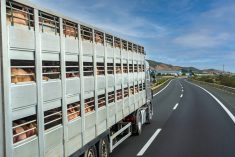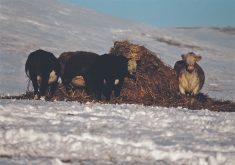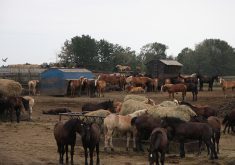Geoff Urton has an egregious example of why Canada needs a new equine code of practice.
The animal welfare manager for the British Columbia SPCA recalls a Vancouver Island case in which a man attempted to kill a horse by hanging it by the neck from a front-end loader.
“No self respecting farmer who had a demonstrated level of care toward their animals would ever think of doing something like that,” said Urton.
“This was a really irresponsible act by somebody who was clearly not capable of providing adequate care to an animal.”
Read Also

Dennis Laycraft to be inducted into the Canadian Agricultural Hall of Fame
Dennis Laycraft, a champion for the beef industry, will be inducted into the Canadian Agricultural Hall of Fame this fall.
Charges were laid but surprisingly, there was no clear direction in the 1998 code of practice that indicated hanging was an unacceptable way to euthanize a horse.
The man was prosecuted for other animal care violations but the case illustrated the need for a code that clearly outlined acceptable euthanasia methods as well as other aspects of equine care and responsibility.
The equine code of practice is one of eight being developed for various animal and livestock species. Urton manages the people on each committee who represent the Canadian Federation of Humane Societies.
“By the time this code is complete, it will be 15 years since the last one, so it’s certainly time for a new code,” he said.
The National Farm Animal Care Council manages the development process for all the codes.
Jackie Wepruk, general manager of the NFACC, said the schedule for the equine code is on track and expected to be ready for a two-month public comment period by November.
Those comments will then go back to the committee, which will make any needed adjustments. The code will then be finalized and released in May.
Urton said the new code will be more explicit than the existing one and will include minimum standards for animal care plus additional recommendations.
Some provinces reference the codes of practice in legislation and others do not, said Wepruk, but “even in provinces where they are not referenced, they can be used as guidelines in terms of what’s acceptable and what’s not.”
Urton said obtaining voluntary compliance is the first aim in cases of SPCA intervention in suspected animal cruelty cases.
Failing that, the code indicates standard practices and minimum standards that have been agreed upon by experts from the livestock industry, veterinary profession, scientific community, government and humane societies.
These can be used to educate or support criminal charges.
One priority Urton has for the new codes relates to animal illness.
“I think the most important re-quirement that will make its way into these new codes of practice, into all of them, especially for horses, is a requirement for sick and injured animals to be treated.”
He said SPCA officers often see cases where lingering animal health problems have not been addressed, causing additional suffering.
All the codes will include a requirement to treat or to humanely euthanize, Urton said.
The equine code development has been underway since January 2011. Committee members have issued three surveys on various aspects of the code, the most recent involving health management and tail alterations.
Such a long process tends to attract committee members who are committed to improving conditions for animals, said Urton.
“They’re really top notch people and they’re professionals. And they themselves sometimes, I think, can’t actually imagine someone doing some of the kinds of things that our officers see in animal cruelty complaints because they’d never let it happen on their farms. The unimaginable unfortunately does happen.”
















